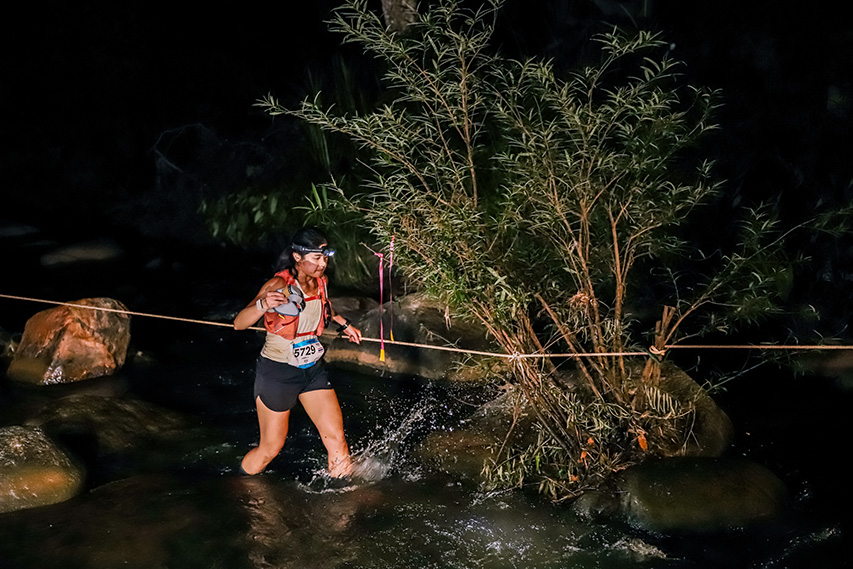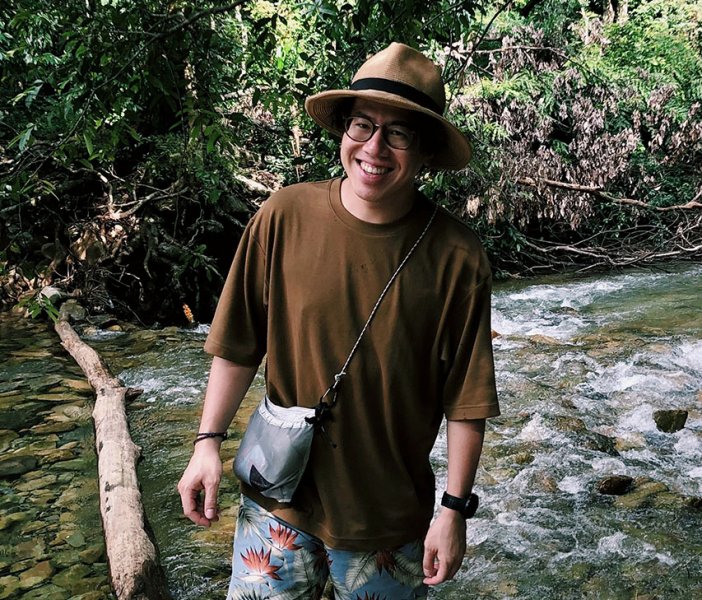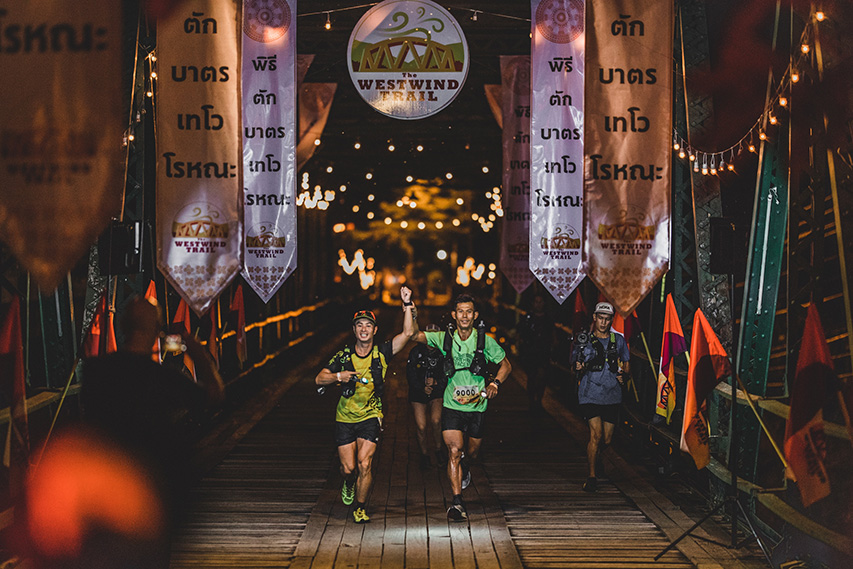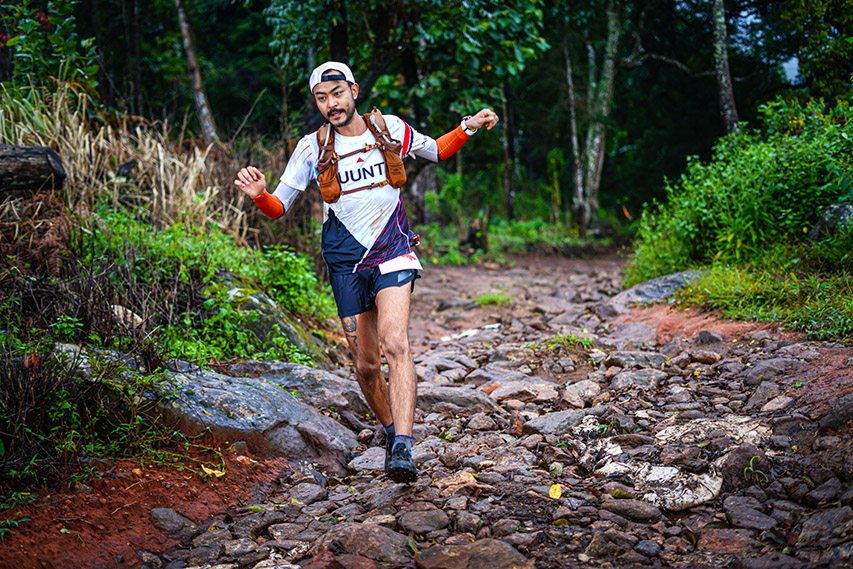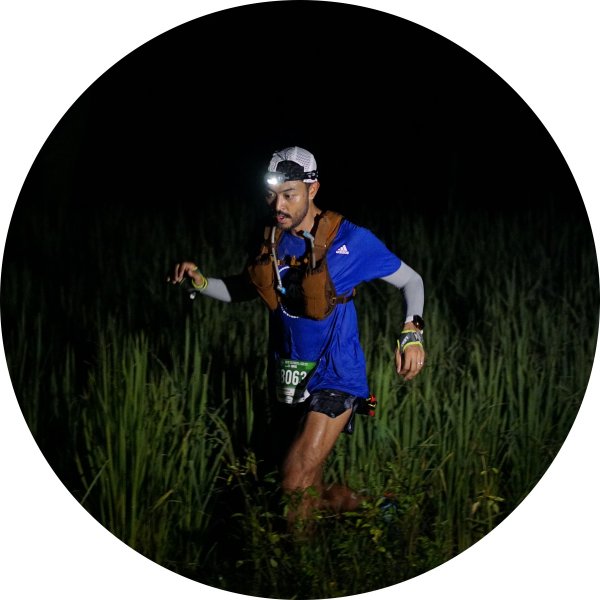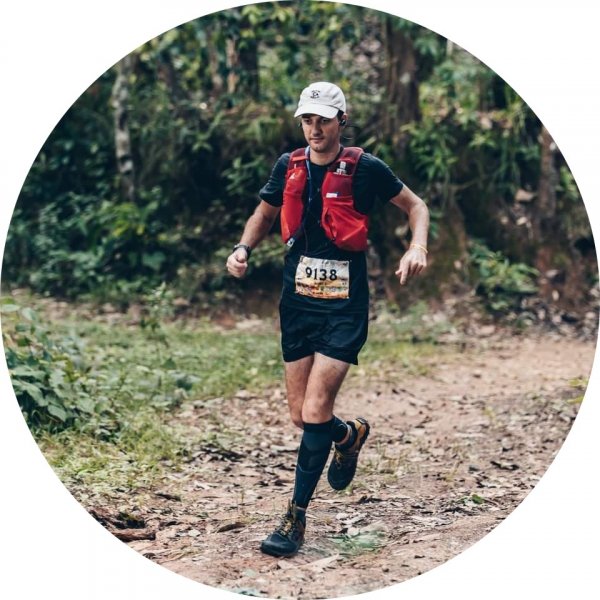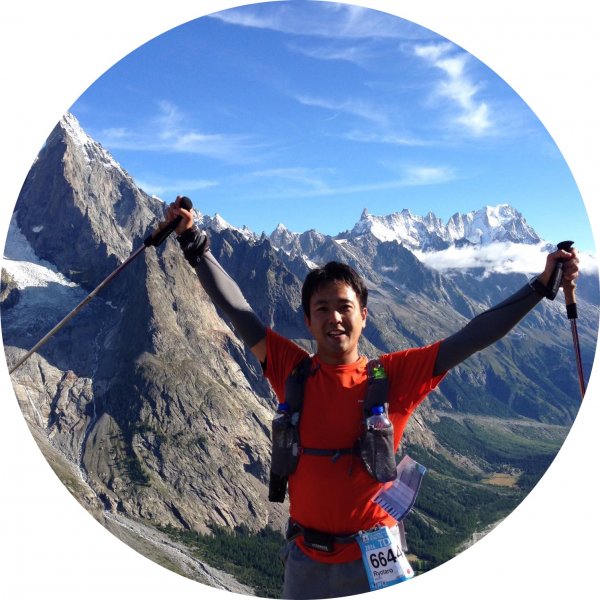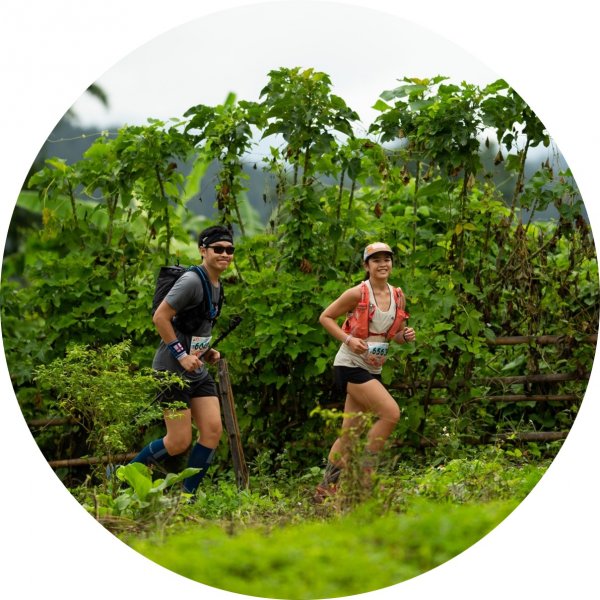Halfway up a mountain in Chiang Mai’s rugged Pong Yaeng district, Varisa Singhamany had run out of food and water. The punishing jungle heat had reached its mid-afternoon peak, the sunlight burning bright through the bamboo and pines, baking everything between the scrub and the sky. She wasn’t sure she was going to make it.
But this was exactly what she wanted.
Varisa was in the middle of a 44k trail race, the furthest she had ever run at the time. She would have to push herself to her breaking point for another hour just to reach an aid station. There, she could refill her water bottles, grab some bananas, and either rest or drop out of the race if her health was in jeopardy. Her legs, her lungs, her body begged her to stop, but she continued.
“I like it when I have to fight with myself in a long-distance trail run. When you think you can’t take it anymore, but you decide to keep fighting, you realize you can really do anything,” she says.
Varisa Singhamany
Varisa is one of several thousands of runners roughing on the trails in Thailand, taking part in a rapidly increasing number of off-road ultra marathons.
In 2016, just 14 trail races were held in Thailand. “But now? Whoa. There are about three a week,” says Chanachai “Top” Ohpanayikool, founder of sports communication agency and organizer Race Hunter, which puts together the popular
Tiger Balm Trail Challenge series in places like Pattaya, Khao Yai, and Chiang Mai.
The rise of long-distance trail running in Thailand reflects a growing global trend. According to Steve Diederich of the
Run Ultra website, 160 trail races were held around the world in 2008. A decade later, there were 1,800. A quick scan of Facebook reveals dozens occurring in December in Thailand alone, from Nan to Sakhon Nakhon, from Ratchaburi to Rayong. But the biggest feather in the country’s cap this year, the one indicating it could someday become Asia’s premier trail running destination, occurred in October. Supported by the Ministry of Tourism and Sports, organizers of Ultra-Trail du Mont-Blanc (UTMB)—a 170k race through the Alps sometimes called the Olympics of ultra marathons—hosted an
official UTMB event in Chiang Mai.
It was the only UTMB race held in the world in 2020.
Not just runners have reaped the benefits, either. Trails like Tanaosri in Ratchaburi are suddenly clear for everyday use, owing to regular maintenance by runners. And, as Top explains, “Since trail races are almost always organized in remote mountainous areas (by Thailand’s standards), runners are spending more money on accommodation, food, and travel. That money trickles down to local communities.”
Discipline, digital detoxes, and self-determination
In 2014, Top founded
Race Hunter with a few friends to offer more options for people like him, who “love traveling and being outdoors.” At the first race they organized in Khao Yai—a relatively flat course ranging in distance from a 3.5k fun run to a 42k fortitude-tester—“we had 1,000 runners, which was already quite a lot [for our event],” he says. “Now, the maximum participants we’ll register is 2,000.”
He credits the sport’s surging popularity to a deeper desire among people to visit parts of the country that are notoriously hard to access. If you want to spend your weekend hiking some of the most popular trails, “you need to book three or four months in advance,” he says. Some, like the route to
Doi Chiang Dao, require you to hire a guide, even if they aren’t particularly difficult.
“In the U.S., you have the Appalachian and Pacific Crest Trails, and in England there’s Pennine Way. These are very well-marked. You can hike for a month without getting lost. Thailand doesn’t have anything like this. There’s no network, no signage, so trail races are becoming an alternative if you want to just hike [and explore these regions],” he says.
Chanachai “Top” Ohpanayikool
Varisa agrees, while also noting that the call of the wild now beckons louder for today’s Internet-dependent city-dwellers. “Society is so digitized now. At some point, you need to go back to nature. It’s good for mental health,” she says.
At 36 years old, she is in the prime of her career, still climbing the ranks in finance management for a multinational oil and gas firm. Like most people her age, she enjoys nights out with friends over beers and big meals. Yet she wakes up before sunrise to run, lift weights, or cross train, and on weekends, she can often be found on the trail, running ever longer distances. She represents the thousands of Thai athletes who are juggling professional responsibilities and making sacrifices to their social lives to stay in shape for the next race.
“I’ll give up alcohol on weekdays. I’ll go to bed at 9pm so I can wake up, train, and still have time to be at work for an 8:30 meeting,” she says. “Every trail race teaches me something about myself—my body, my mind—and I get to spend the day in the woods, which I love.
“I think long-term now. I’m going to do this the rest of my life.”
Elite athletes give Thailand runners to rally behind
Beyond upwardly mobile athletes, the community forming around the sport has been aided by elite runners who have begun to put Thailand on the map across Asia and Europe.
Kiangchaipaiphana “Jay” Jantaraboon might currently be the nation’s best. That’s no small feat considering contemporaries like Phairat “Rushie” Varasin and Sanya Khanchai, who won the inaugural Thailand by UTMB 170k and recently set the 230k course record at Ultra-Trail Chiang Rai (36 hours and 20 minutes), have represented the Thai flag at races like UTMB in Europe.
Jay doesn’t look like your average runner. He has the physique of a bodybuilder—legs like tree trunks and arms that belie his ability to run 20-plus hours at a time. He logs 150-200k per week during peak training cycles. In 2018, he was the top Asian runner, and fifth overall, at the grueling 168k Ultra-Trail Mt. Fuji race in Japan, finishing in 21 hours and 30 minutes. And yet he’s humble. “In the future, I want Thai runners to run faster than me, do better than me on the international stage,” he says. That makes him enduringly popular. According to Top, his mere presence at races can drive sign-ups.
Perhaps most impressively, Jay says that Thailand’s elite trail runners are largely doing it on their own.
None receive sponsorship that allows them to be full-time athletes. Instead, they work as coaches or speakers to make a living and tackle Thailand’s trails in their free time to stay fit. “I was once offered an opportunity to become a professional runner, but I didn’t want to pressure myself into having to deliver all the time. I think I would have lost the joy of running,” he admits.
“Right now, I’m signed with The North Face Adventure Team Hong Kong. The [sponsorship money] only covers the expenses we have to pay when we run: airplane tickets, accommodation, food, running gear,” he adds. “It isn’t enough for my daily life or to save money.”
The Sports Authority of Thailand, however, has recognized the potential for the sport to benefit tourism, health, and national prestige, saying through press releases that the agency “sees significant implications for raising the level of domestic trail running events,” and that it hopes to “put Thailand on the map of world-class trail running.” Even so, the agency hasn’t yet committed to changes that might provide the support the sport needs to blossom. There are no definitive plans to create a trail network for athletes to use, and elite runners like Jay do not receive the kind of financial support from a governing body that could facilitate their training.
Still, considering his Chiang Mai-cool comportment, it should come as no surprise that Jay takes a holistic approach to trail running. “I just want everyone who’s involved in ultra running to give as much respect to one another as they can, whether it be organizers or athletes. And whenever we run, we should respect animals and the environment,” he declares.
“Is this pain normal?”
Even elite athletes like Jay have only been running trail races for about a decade. Being such a young discipline, it’s prone to the winds of change. The sport’s popularity could fade, like how participation in road running events has fallen 13 percent since 2016, according to a study conducted by
RunRepeat. On the other hand, runners might find themselves excelling beyond their expectations as they test themselves over longer and longer distances, just like Mont Watanasiriroch has.
A design entrepreneur, DJ, and member of the Adidas Runners group, Mont might not consider himself an elite runner, but his performances betray undeniable talent. He only started running seriously in 2015, after years of neglecting fitness for work. “The turning point was when I got divorced,” he says. “I felt broken. I wanted to bring my old self back, when I was strong mentally and physically.”
Mont Watanasiriroch
In 2017, in rapid succession, he ran his first 10k, half marathon, and marathon. By 2019, he had run his first 100k race. This year, he finished in the top three at two major races: the Doi Nhok Trail 50k and UTMB by Thailand 120k. In early December, he won the 30k at Nan Mountain Trail, a race that featured 2,045m of elevation gain over a relatively short distance.
But he admits he runs simply to challenge himself, not to win accolades. That makes him an unwitting role model for those who want to find out what strength lies within themselves.
“The first time you run more than two hours, you feel something in your body that you’ve never felt before,” he says. “It’s like, ‘Are you going to get sick? Is this pain normal?’”
For his first 100k, he joined Pong Yaeng Trail—the same event in which Varisa found herself fighting with the devil on her shoulder to keep going. “I was so nervous. I had been training so hard. I didn’t want to finish it having had a bad experience,” he says. Twenty-two hours after taking off, he crossed the finish line. Then, he signed up for another 100k. And then another. And another.
“I like being in nature for a very long time. You feel peace from the madness of the city,” he admits. “I especially like running at night in the woods. Sometimes I even turn my headlight off and try to hear what’s out there. You’re not going to get to do that in Bangkok.”
In January, Mont will run the
Westwind Trail 60k in Pai. Soon, he hopes to give a 100-mile race a shot. Varisa is eyeing her first 100k at Doi Muser in Tak in 2021. Top is hard at work mapping the next Columbia Trail Masters 50k. Jay is always running, chasing personal records and living for the moment. Like so many in Thailand, they are eager to see where the trail takes them.
Advice for beginners from Bangkok trail runners
Joseph Henry, longest distance run: 100 miles
Trail running can be very challenging, but it’s one of the most satisfying experiences you can have.
Mont Watanasiriroch, longest distance run: 120k
Don’t push yourself too far, too fast. Take it slow and make sure you’re prepared.
Randy Travis, longest distance run: 110k
Pick a race that’s similar to your training environment, push yourself in training, and then enjoy the challenge during the race.
Ryotaro Hori, longest distance run: 162k
Ultra running is a journey—it’s not just about running.
Varisa Singhamany, longest distance run: 60k
Always have fun with it, even when you’re taking yourself to your limits.










